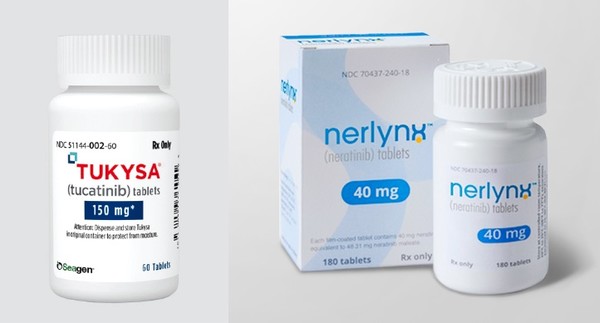Human epidermal growth factor receptor (HER) 2 inhibitors, known to be effective in treating brain metastasis in HER2 positive breast cancer, are expected to compete in the Korean market in earnest.
On Thursday, the Ministry of Food and Drug Safety approved a phase 3 HER2CLIMB-05 study of Tukysa (tucatinib), a HER2 inhibitor.

The study will compare the combo therapy of tucatinib to the placebo with trastuzumab and pertuzumab as maintenance therapy for metastatic HER2-positive breast cancer. Researchers have tested Tukysa in four clinical programs since June 2020.
Tukysa is an oral tyrosine kinase inhibitor (TKI) that inhibits HER2 protein.
The original developer, Seagen, received FDA approval for combo therapy trastuzumab+capecitabine+turusa on April 17, 2020, to treat unresectable, advanced, or metastatic HER2-positive breast cancer patients who had received at least one anti-HER2 therapy before, including those with brain metastases.
Tukysa showed therapeutic effects in brain metastasis patients because it could penetrate the blood-brain barrier (BBB) that conventional antibody treatments couldn’t.
After winning approval, Tukysa proved the effect to prevent brain metastasis, which drew much attention from physicians.
About half of HER2-positive metastatic breast cancer patients have brain metastasis, and this area's clinical unmet demand is high.
MSD holds the right to sell Tukysa in Korea.
In September 2020, MSD signed an exclusive licensing agreement with Seagen to commercialize Tukysa and received the sales right in countries excluding the U.S., Europe, and Canada.
MSD is a multinational drugmaker owning anti-PD-1 immunotherapy Keytruda (pembrolizumab). Its Korean offshoot has already established sales and marketing in oncology and produces massive sales. Thus, the company is ready to sell Tukysa in Korea.
Earlier, Korean company Bixink Therapeutics introduced Nerlynx, another HER2 inhibitor, in Korea in October 2021.
Puma Biotechnology developed Nerlynx, which obtained FDA approval as an extended adjuvant therapy to treat early-stage HER2-positive breast cancer in July 2017.
In February 2020, Nerlynx expanded indications to treat metastatic HER2-positive breast cancer.
Bixink Therapeutics, a startup, obtained the sales right of Nerlynx, and the drug is authorized as the extended adjuvant therapy for early HER2-positive breast cancer.
Bixink Therapeutics focuses on building a rapport with local physicians through a patient support program.
According to government data, the Ministry of Food and Drug Safety authorized the therapeutic use of Nerlynx in eight cases to support metastatic patients.
Before winning local approval, Nerlynx was used only in specific university hospitals for therapeutic purposes.
After the approval, however, the treatment is available in various hospitals.
However, the expanded use of Nerlynx in Korea is still limited because the company’s application for Nerlynx reimbursement to the Health Insurance Review and Assessment Service (HIRA) has not passed the Cancer Drugs Benefit Appraisal Committee in February.
The regulator reviews whether to reimburse Perjeta (pertuzumab) and Kadcyla (trastuzumab emtansine) for adjuvant therapy before and after surgery for early HER2-positive breast cancer talk Nerlynx reimbursement will be put on the back burner, observers said.
A HER2 inhibitor’s clinical value is higher in metastatic brain stages, but Nerlynx does not have that indication in Korea.
With heated competition among HER2 inhibitors, attention is on how MSD and Bixink Therapeutics will move.

